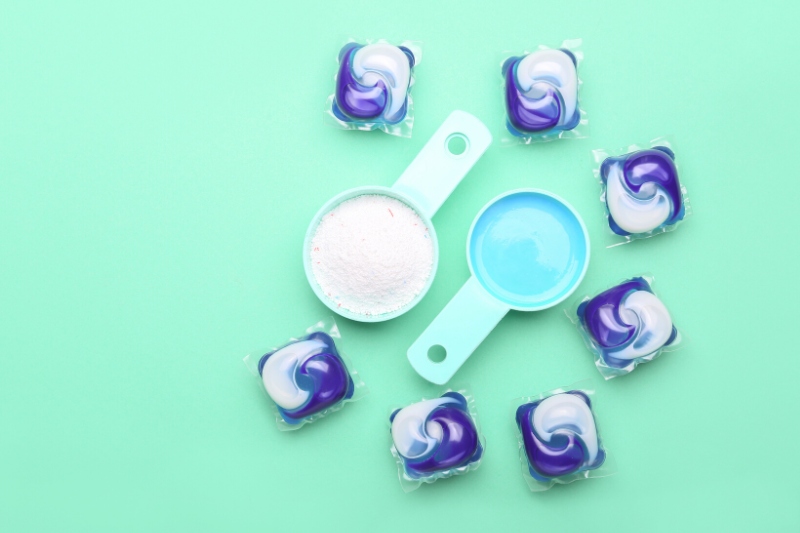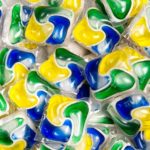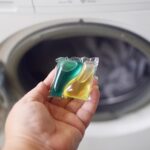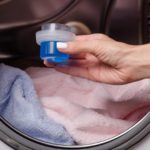With the wide variety of different laundry detergents available, it can be hard to know which one to buy.
Not only do you have to choose between brands, scents, and whether the detergent is non-bio or not, but you also have to choose which type of laundry detergent you want.
The four most common types are powders, pods, liquids, and sheets, but which of these is the best type of laundry detergent?
Below we have compiled a comprehensive guide to help you decide the best option for you.
Powder Laundry Detergent
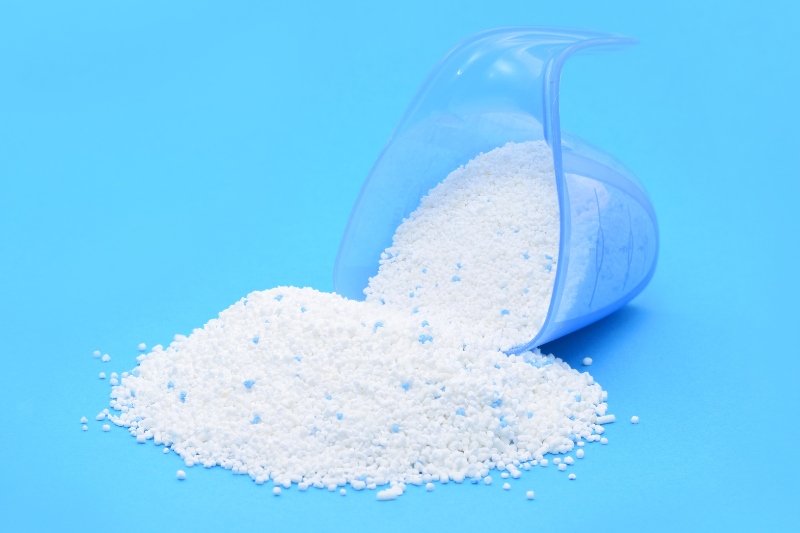
Out of all the laundry detergents on this list, powder detergent has by far been around the longest.
As suggested by the name, this kind of detergent comes as a powder that is added directly to the washing machine drum before each wash cycle.
It’s not as commonly found anymore, as liquid and pod detergents have become increasingly popular, but it can still be purchased from supermarkets; you will have a smaller selection to choose from.
Pros and cons of powder detergent
Because washing powder doesn’t contain liquid, it has more additives than other detergent forms. This makes it highly effective at removing outdoor stains (e.g., grass and mud stains) and means that it generally has a longer shelf-life.
However, you will have to make a paste using warm water to use this detergent to pre-treat stains before washing them.
This kind of detergent is also the cheapest option per load and generally comes in recyclable packaging.
Although this helps to make these products very environmentally friendly, the large boxes are heavy and tend to take up a lot of storage space.
The main issue with powder detergent is that it sometimes leaves behind residue on your laundry and in your washing machine when you use a cold wash setting.
This occurs because the detergent doesn’t dissolve properly.
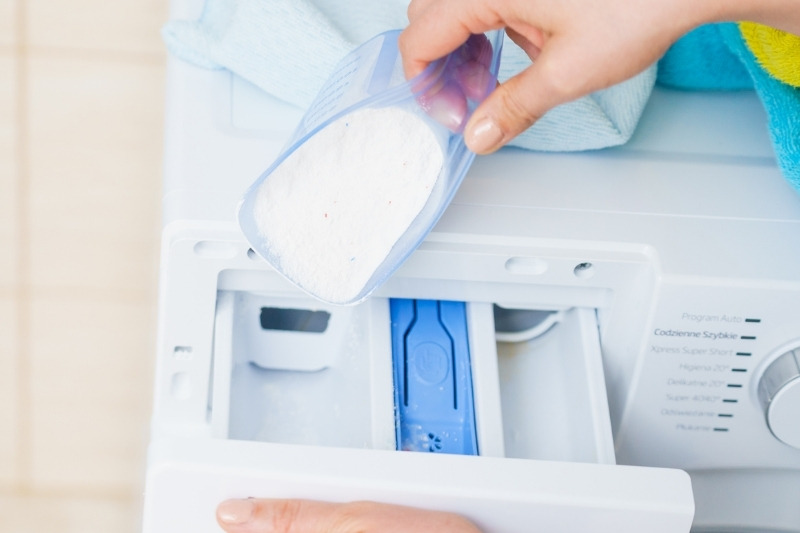
Pros
- Effective at removing tough stains
- Long shelf life
- Recyclable packaging
- Cheapest option per load
Cons
- Packaging is heavy and takes up a lot of space
- Can leave behind residue
- Can’t be directly used to pre-treat stains
Washing Detergent Pods
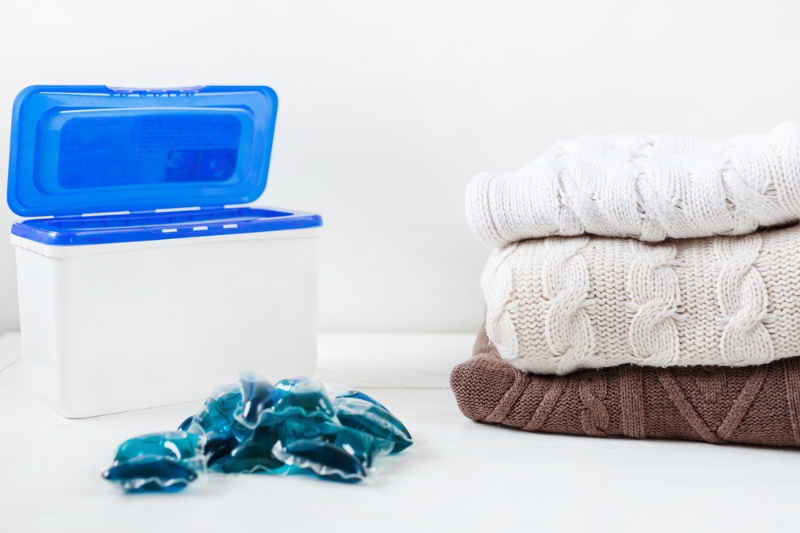
When it comes to convenience, detergent pods are one of your best bets.
These are small pods of highly concentrated detergent coated in a polyvinyl film. This film dissolves in contact with water, releasing the enclosed detergent.
Some brands also build in fabric softeners, stain removers, brighteners, or scent boosters so that everything you need is in one pod.
Since they were first introduced by Ariel in 2012, this type of laundry detergent has frequently outsold all other laundry products.
This is primarily because washing pods are specifically designed to be easy to use: each pod contains the exact amount of detergent needed for an average load of washing. You simply need to throw one in the drum before adding your clothes.
Pros and cons of washing pods
Unfortunately, the fact that pods come pre-measured does mean that you can’t use this detergent to pre-treat any stains.
You may also have to use more than one pod for a load of laundry that is particularly soiled. This increases the cost per load and can make this form of detergent quite costly.
The biggest issue with laundry pods is that young children often mistake them for sweets. When ingested, these pods are incredibly dangerous, so you need to ensure that they are stored out of reach of anyone at risk.
Thankfully, the packaging is typically small and lightweight, making it easy to keep out of sight.
There is also some concern that washing pods will damage your washing machine by leaving behind plastic residue.
Although this was a genuine worry in the past, modern detergent pods will completely dissolve even when used in a cold water wash.
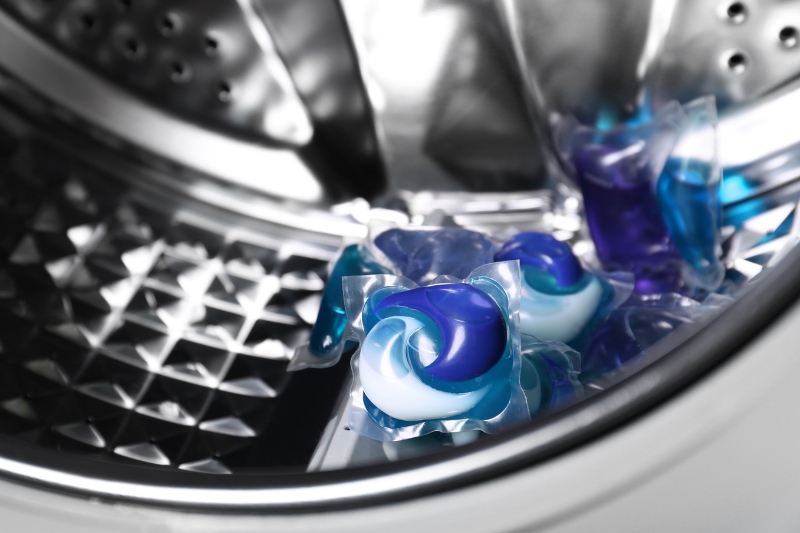
Pros
- Pre-measured for ease of use
- Lightweight and little packaging
- Can come with other laundry products built-in
Cons
- May need to use more than one
- Can be dangerous to children
- Can’t be used to pre-treat stains
Liquid Detergent
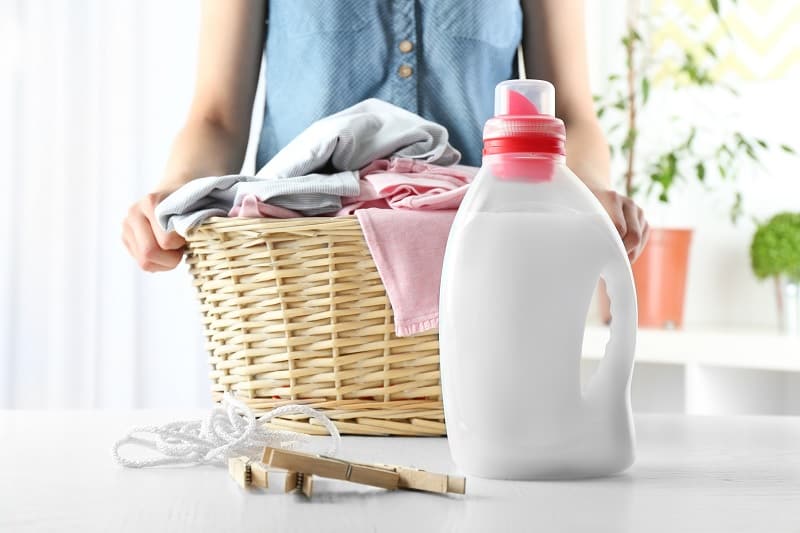
Liquid laundry detergent has been a popular choice among homeowners since it was first released in the 1950s.
It typically comes in a large bottle with a measuring cap. You can then measure the amount of detergent you need and pour it into your machine’s detergent dispenser.
Pros and cons of washing liquid detergent
The main ingredient in liquid detergent is water. Unfortunately, this means that the shelf life of these detergents is usually shorter than the others in this list. It also means that the large bottles are big and heavy to store.
However, liquid detergent is well-known for being highly effective at removing oil and grease marks from clothing. It can also be used as a pre-treatment on stains by lightly applying the liquid directly to any stained fabric.
The fact that you measure out the detergent yourself also means that you can adjust the amount used based on the size and dirtiness of your laundry load.
However, it can be challenging to read the measurement lines. This means that many people use more detergent than is needed, which both wastes money and causes a residue to be left on your clothing.
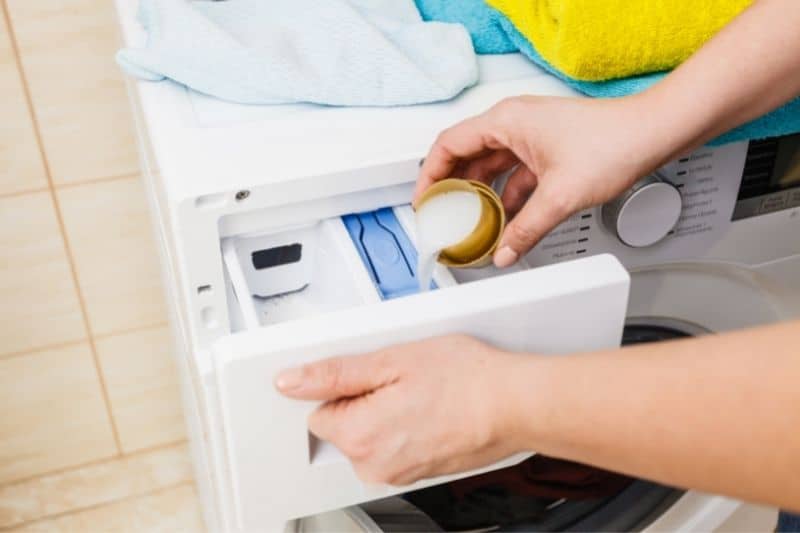
Pros
- Can be used to pre-treat stains
- Works well for removing oil and grease
- Manually measured to suit your load
Cons
- Packaging is big and heavy
- Measurement lines can be hard to read
- Can leave behind residue
Detergent Sheets
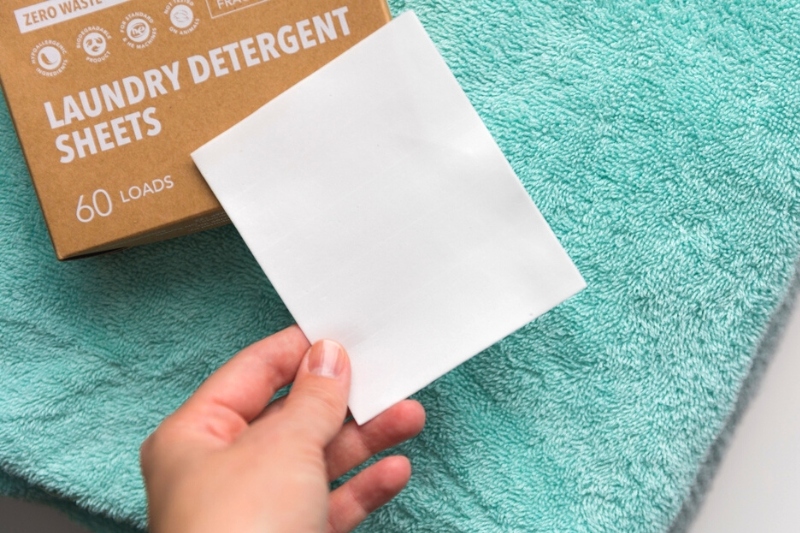
Out of all the detergent options on this list, laundry sheets are the one that the fewest people know about. This detergent is the latest type to hit the shelves and has a similar concept as detergent pods in that they are designed for convenience.
The idea is that each sheet is filled with enough concentrated detergent to clean a typical load of laundry.
These sheets will either dissolve when they come into contact with water or transform into dryer sheets, helping you save money.
Pros and cons of detergent sheets
The boxes that detergent sheets come in are very slim and lightweight, making them very easy to store.
However, although single-use sheets save you the hassle of measuring our detergent before each wash, it does mean you may have to use more than one sheet in some cases. If this happens regularly, it can soon cause the cost per load to increase significantly.
Another drawback of detergent sheets is that they can’t easily be used to pre-treat stains. To do so, you would have to go through the effort of dissolving one of the sheets in hot water, using the solution to treat the stain, and then pouring the rest into the dispenser like a liquid detergent.
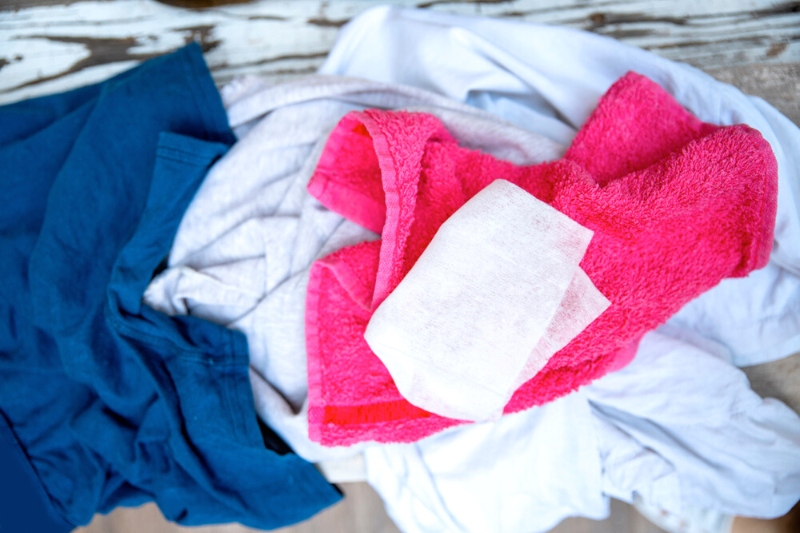
Pros
- Pre-measured for ease of use
- Can double as dryer sheets
- Lightweight and easy to store
Cons
- Can’t be used to directly pre-treat stains
- May need to use more than one
Factors to Consider When Choosing Laundry Detergent
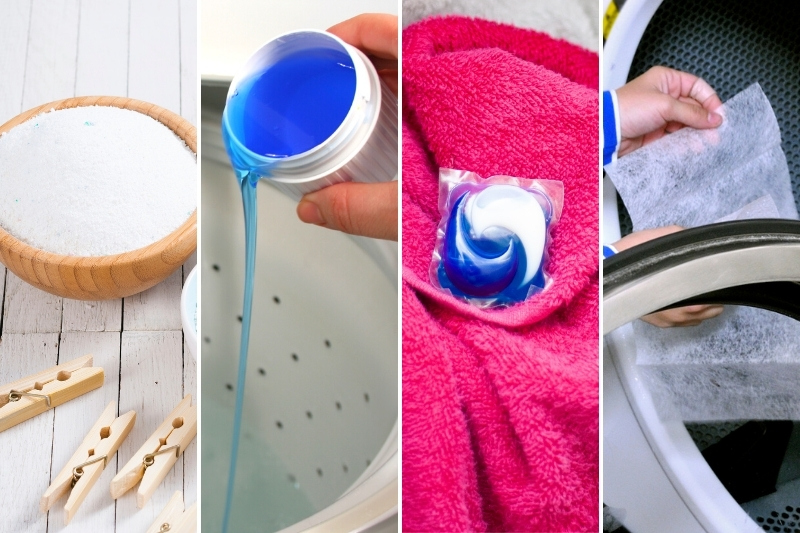
When choosing a laundry detergent, there are some factors you need to consider other than the detergent type. These are as follows:
- Sustainability: No matter which type of laundry detergent you prefer, eco-friendly options are available. If you want to be more sustainable in your purchases, look out for detergents that have recyclable packaging and are free from synthetic chemicals. Smol and Ecover and two eco-friendly brands that we highly recommend.
- Allergies: Those suffering from skin allergies must take care to choose a detergent that won’t cause them any issues. In general, non-bio detergents are best as they are milder and contain fewer chemicals and fragrances.
- Fragrance: Most laundry detergents will come fragranced so that your clothing smells nice and clean. When buying a detergent, make sure to choose one with a scent that you like. There are also products that have no fragrance if that is your preference.
- Machine type: If you own a high-efficiency washing machine, you need to make sure you buy a high-efficiency detergent. Nowadays, most detergents are high-efficiency, but you can also look out for a blue logo that says “h.e.” to ensure you’re buying the right one. Using a regular laundry detergent in these machines results in over-foaming and needs to be avoided.
- Water temperature: When you typically wash your clothes in cold water, you want to make sure the laundry detergent you choose is compatible with cold water washes. Nowadays, most detergents are designed to work well in cold water, but liquid detergent is typically your best bet, as nothing needs to dissolve for the product to work.
- Substitutes: If none of the laundry detergents in this list take your fancy, there are plenty of alternatives you can try. Some popular options include using soap nuts or making a homemade detergent using natural ingredients.
What Laundry Detergent Should I Use?
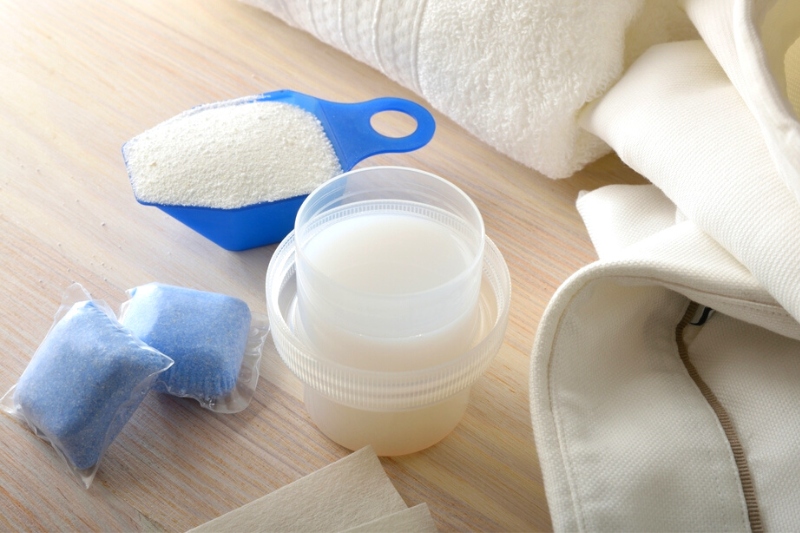
The type of laundry detergent that you use is entirely up to you. However, in terms of effectiveness, we highly suggest you go with a liquid detergent.
Although powders, pods, and sheets will do a good job of cleaning your laundry, liquid detergents don’t need to dissolve, and so typically work best when doing cold water washes.
Liquid detergents can also be used to pre-treat stains without any hassle, saving you money on other laundry products.
They are not quite as cheap as powder detergents, but budget options are available for those who want to save a few more pennies.
In terms of ease of use and sustainability, pods and sheets will always win. However, liquid detergents allow you to alter the amount used per cycle depending on the load.
There are also plenty of eco-friendly options available. For example, Splosh reduces plastic waste by offering refill pouches that can be returned to the company and reused.

Hannah has a passion for cleaning. She worked her way around Australia by cleaning hostels in exchange for free accommodation and used her cleaning skills to bag a job as a chalet host for a luxury ski company in France.
